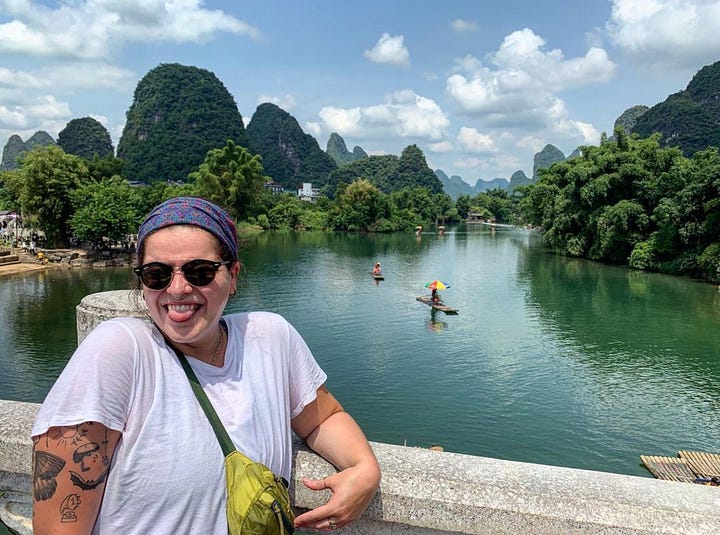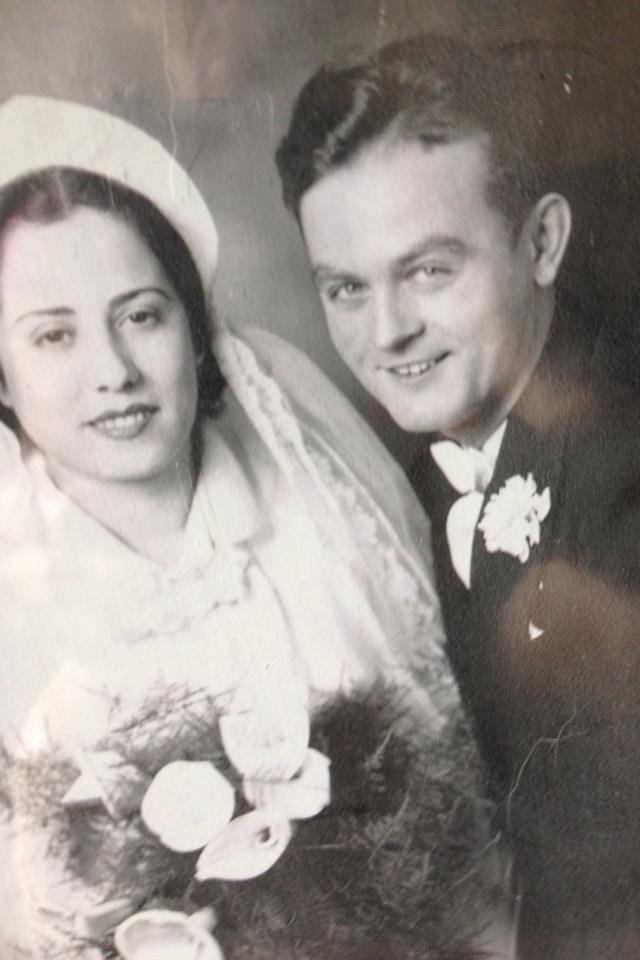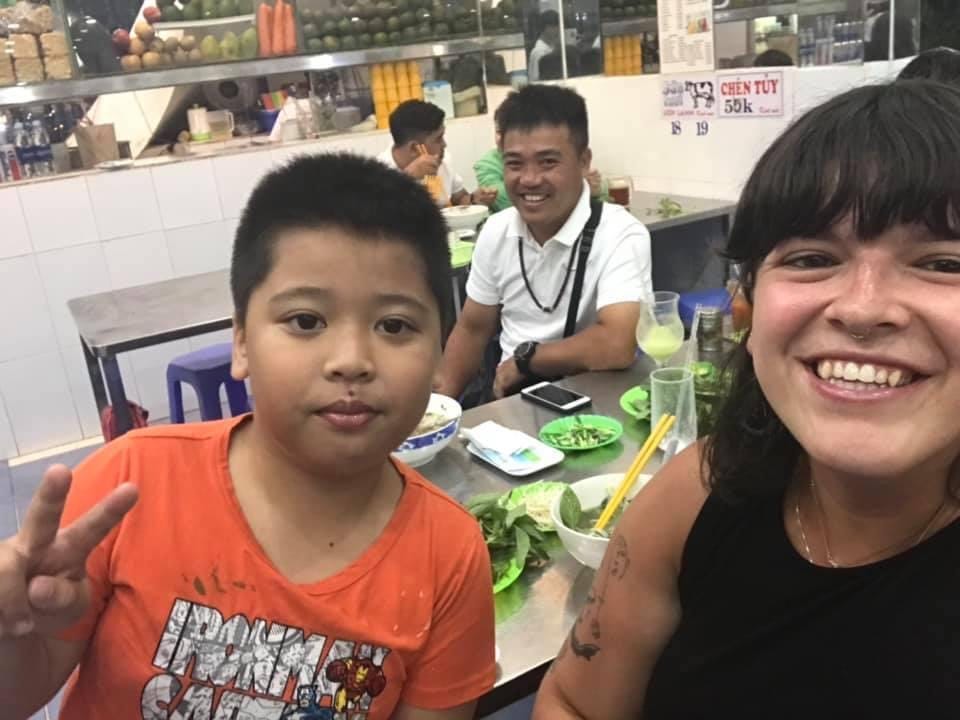Portrait of a Palate: Liliana Hall
Food as a connection to our roots and a gateway to the world
Portrait of a Palate is a series of interviews exploring an individual’s relationship to food, how it’s shaped them, and how that relationship has evolved over the course of their lives.
Liliana Hall is an Austin-based journalist and the voice behind @travelwithnoexpectations on Instagram. You can find her cruising the live music capital on a cherry-red moped, practicing Portuguese, eating anything with avocado and hot sauce, and researching her next travel destination.
LINDSEY OTTO: How would you describe your relationship to food?
LILIANA HALL: My relationship to food has always been positive because, to me, food is family. My mom is a third generation Italian. Her great grandmother immigrated to the U.S. from southern Italy in the 1920’s to flee fascism. She fled through Ellis Island; a young Italian woman who then fell in love and moved to Pittsburg. My grandmother and mother were both born in Pennsylvania.
My Italian roots truly represent my love for food. Growing up, food was everything. We were not taught that food was the enemy and was going to make you fat. Food was fuel, but it was also what binds us as family. Everything that we did together involved food, whether I just in the kitchen helping my great grandmother and having a bonding moment. Everything. Every good memory of my childhood involves food somehow.
I always think of my great grandmother because you did not walk into that woman’s house and leave hungry. She influenced my love of food and of the intersectionality of food and culture. Food represents roots, family, heritage, and land — no matter where you go. To me, that’s very exciting. When I travel somewhere, that’s why I’m so drawn to the food. You learn the most about a place through its food.
OTTO: I’m thinking about the limoncello you recently made and spoke about how it was something your great grandmother always made.
HALL: Oh, yes. Talk about your roots!
Limoncello in Italy is considered a digestivo — it’s a digestive you have after a meal. They’ll tell you: It is helping clear you for breakfast. It’s all about, how can we eat more? And I think that’s so Italian. I love it. In any Italian household, and at the end of any meal I had in Italy, there was always limoncello. Growing up, we would never buy it at the liquor store, great grandma is making it. She always had bottles on the floor of her pantry because to ferment it, it needed to be in a dark space. She would always have those bottles — and all sorts of different kinds too, like cream limoncello. You name it, that woman had it. I was always mesmerized by it.
Italians, I mean, they’re drinkers. If you’re 13 and having a little red wine at dinner, that’s normal. For limoncello, I wasn’t allowed to have it until I was 17 or 18. But I always thought it was so delicious. It was also a mission for me to make it. I don’t know why I thought it was going to be more challenging than it was. It just takes time. It requires a lot of patience.
My roommate and I made it together. She’s also Italian. Every day we would open the pantry and be like, “She’s cooking!” We were so excited to try it. I brought it to my mom, along with a bottle of store-bought limoncello (my great grandmother would strike me dead if she heard me say that). But with a glass of each, I didn’t tell her which one was which, she tasted mine and she tasted the store bought. She said mine was far superior.
This is now my mission in life, to supply the masses with limoncello.
OTTO: Can you recall a specific meal or dish from your childhood that holds a special place in your memory?
HALL: For starters, my mom loves to cook and she’s a fabulous cook. She got that from her mom, the Italian parent. On our birthdays growing up, it was a big deal to have her cook our favorite meal. To this day, we still do it.
If I could only eat one thing for the rest of my life, it would be my mom’s stromboli. The way my mom makes it is very typical of southern Italians. It’s loaded with vegetables, tons of meat, tons of cheese, and no sauce. There’s no sauce in her stromboli. That would be criminal. That’s a calzone, which is not a stromboli. It’s very strict as to what goes into the stromboli.
She kneads the dough. She goes to the deli to get the meat and cheese. It’s so spectacular. I think I’ve asked for that for my birthday for the past 15 years, and it’s not something she makes often because it takes two days. You make the dough and have to let it rise overnight. It’s just my favorite.
That definitely makes me think of my great grandmother and having that in her house. That was my childhood: For my birthday to roll around and my mom to ask, “What do you want to eat this year?” I always said, “What do you think?” To this day, she still asks me. And I always spend my birthday with my folks, because, well, I want the stromboli.
OTTO: Is that recipe for stromboli one that’s been passed down in your family too?
HALL: Oh, yeah. My mom has an old-school, what looks like a church cookbook. Every family member has a recipe in this cookbook handwritten on pieces of paper. It will say “Recipe by Nani” for example, who was my great grandmother. The original copy is very special to her because there are food stains in it. My mom can tell a story of how my great grandmother spilled this pasta sauce on that page, and things like that. The book deserves to be enshrined. It’s been passed down through my whole family. I tell my brother I’m going to arm wrestle him for it, and he goes, “You can have the cookbook.” I’m like, “You don’t want the cookbook??”
OTTO: What was your kitchen like as a child?
HALL: I grew up in the suburbs outside of Dallas, where every house in the neighborhood looked the same. I lived in that house my whole life. My folks just moved out of it three years ago. It went through different stages, but growing up the kitchen had that cherry-brown wood that had a red hue to it.
The kitchen was my mom’s office. She had a long career and got to a point where she could walk away from it and be at home. To this day, I hear her telling my dad, “Your things on the counter do not belong there because this is my office. Respect the office.” It became this joke to respect mom’s office.
Although it had a counter that was L-shaped, and my mom hated that. The dream to her was a galley kitchen, and she got that when they moved to their house in Austin. She always said things were too far apart, which is interesting because people usually want more space, and this kitchen was humongous. It had an island with a sink in the middle and it was very spread out. It was beautiful. I can imagine being in there with my mom, baking a cake using the KitchenAid mixer, getting the batter all over the ceiling, and just laughing because I didn’t put the handle down. Little things like that.
I think the galley kitchen reminds her of her childhood because she was raised by my great grandmother. I distinctly remember my great grandmother’s galley kitchen and the window with a scalloped curtain looking out into her garden. I think my mom wanted the view of her garden probably because it reminds her of that. And I think that’s sweet, because, why not? That might have been everything she ever wanted.
OTTO: How has food played a role in the formation of your own identity?
HALL: For the first half of my life, my relationship with food was really my connection to my roots. As I got older and started to travel, food was my gateway to the rest of the world. My curiosity was sparked by food, and also because I recognized that connection to roots.
I’ve done a lot of solo travel where I’m sitting down in a restaurant by myself, and I feel the bonding nature of food. I remember going to Vietnam, being in Ho Chi Minh City in a pho shop a friend sent me to. “This is the introduction to Vietnam you need and you should have it solo,” she told me. I was like, “Done.”
I took a DiDi, which is a moped. I ordered it and got on the back of some man’s moped. It was hysterical because we didn’t exchange any words. I didn’t know his language, he didn’t know mine. I remember hopping on his moped and laughing the whole time, laughing in glee, thinking, This is the best day of my life. It was probably a dollar to go six miles. I went into the pho shop. Everybody and their mother was there. I figured out where to finesse my way in and ordered my pho. I was drinking a beer with ice cubes in it and enjoying my night.
Then, this little boy who was sitting diagonally from me looked at me and went, “Where are you from?” I reply, “I’m from Texas. Where are you from?” He goes, “Here.” And I loved it. His dad leaned over and whispered something to the boy, and the boy asks, “My dad wants to know why you’re here.” And it went like that for an hour, him asking questions and me responding.
OTTO: The dad didn’t speak English?
HALL: No English. His seven-year-old son was translating, and we were the last three people in that restaurant. Then, they get up to leave, and we’re smiling and we say to each other, “So nice to meet you!” And I just sit there, still smiling, decompressing, like, What just happened? It made my whole day. I had had a rough travel day and it was such a wonderful introduction to Vietnam. I stood up to pay the check and the woman at the front told me, “They paid for your meal.” I was like, “No they didn’t,” just in disbelief. She didn’t understand me. I just looked at her like, Are you for real? She just looked at me. I literally started crying. What a wonderful, wonderful first night in Vietnam. That was just everything to me.
I have so many stories like that, which is why I love to travel. You might not have that experience when you’re engrossed in a conversation with someone else, and that travel is essential too, to spend time with someone you are with. But I just think how food is what brought me those conversations and intentionally so. I seek that out. That, to me, is how I get to know a place and its people. It’s through food.
OTTO: I think we all dream of having experiences like that when we travel. From what you’ve shared about your upbringing and the curiosity you now have of the world as a result, how has your narrative around food changed as you’ve aged?
HALL: Being a girl and going through the stages of girlhood and womanhood, I can’t sit here and say I haven’t entered a period of my life where I questioned my relationship with food. At times I thought, Maybe I love it too much and that’s why I look this way. I’ve always had a very healthy relationship with food and my body and that stems from the confidence I got from my mom. My mom raised me to love my body, have the confidence to love my body, love to eat, and never limit myself because that’s what society expects of me.
I won’t speak for every woman ever, but you hit a point in your life where you think, I’m too fat or my boobs are too big because I eat too much. The societal pressures get to you. And I have had different times in my life where I’ve questioned my relationship to food because I thought that’s what I was supposed to do. I don’t fit the mold to what a beautiful woman looks like. And that's what happened to me in my very early twenties when I was in college, drinking heavily and seeing the change in my body. I definitely had that internal dialogue on and off for years.
Now, I love the body that I have been given and I don’t let those thoughts encroach my mind. I was raised to love myself and the food that fuels me and has built this body. Society says, That’s not good enough. I hate that. I hate that women and men and all people have to go through that. I think, Why do we do this to ourselves?
OTTO: It sounds like you have a really solid foundation from your parents.
HALL: Yeah, I’ll say too that food is never meant, in my opinion, to be a reward. I think that’s what my mom meant to instill in us. Food is not a reward. You need it to survive so might as well have fun doing it. I definitely think as children we absorb that. I was always a bigger-boned girl. My mom always said, “I like a girl with a little meat on her bones.” And to this day, I think about that. It’s done wonders for my adult brain.
It was also influenced by the other women in my life growing up, watching them and their relationships to food and that having an influence on me.
OTTO: You’ve spoken so much about your family and how the people in your life have impacted your experience around food. Are there any other variables in your life that have influenced the way you view food?
HALL: I am by no means a frugal person, and when it comes to food, there are no limits. Perhaps that’s a problem and one day will generate lots of credit card debt, but it has yet to happen. I would rather spend my hard-earned dollars sitting here with you chatting and enjoying a good meal.
That’s why I get a breakfast taco that’s only a few dollars or I eat street food. Honestly, some of the best food in the world is street food, and it’s cheap and delicious. Financially, I’m not worrying about that. Life is short, we gotta eat — and we gotta eat well.
I think about the concept of time in the U.S. and its hustle culture. It’s go, go, go. You’re picking up something quick and heading back to the office or you’re going through a drive through. Yes, that’s economically more feasible and accessible, and you have to have those options.
But from a cultural angle, I love countries where time is of no object when it comes to food. You have a three-hour long meal because that time is valued. In my life, to be able to spend time cooking, by myself, or with a partner or friend, and not worry about the time, that’s what I love. It’s an experience that I value. Sometimes it’s necessary to UberEats Taco Bell, absolutely. I am not saying it’s not. But to me, in an ideal world, convenience isn’t something that dictates my choices.
OTTO: Food is a lifelong relationship. What would you say to your younger self — knowing all that you know now — about that relationship?
HALL: Eat that second bowl of pasta. Don’t ask to go to the Cheesecake Factory for your birthday. Enjoy the sweet essence of a home-cooked meal. Eat three servings if you want it. Ask to take some home with you. Just enjoy it.
For the most part, that little girl did enjoy it. But eventually, I got to the age where, like I said, it haunts you. You feel guilty and not worthy. It’s easier said than done, but just enjoy it. A lot of my childhood was sitting down at the dinner table with my big Italian family and eating really fast because there were so many people there. I want to say [to that little girl], “Take the last meatball! Just do it!”
OTTO: Now that we’ve spent time talking about the past and the present, what do you hope for in the future as it relates to food?
HALL: I hope that it keeps shaping my global perspective because that’s where there’s always room for growth. Having a global perspective helps you have constructive conversations about climate change, global warming, and topics related to politics. But also, things that aren’t as serious too.
When I have a family of my own one day, I hope that I can also create and build the same narrative around food that my family did. It made me the happy person I am. I’m not saying food alone made me that way, but it had a big influence. I hope I can recreate that one day. I also just love to eat, and I will continue eating forever. That is what drives me around the world.
Note: This interview has been edited for length and clarity.


If you have a unique food story or know someone who does, submit an interest form for them (or yourself) to be featured in Portrait of a Palate!










